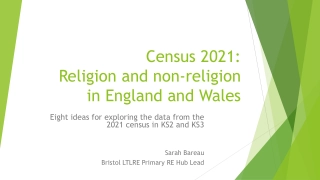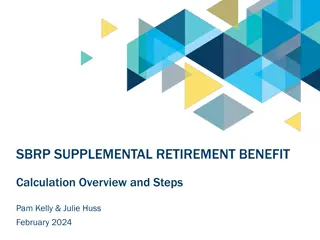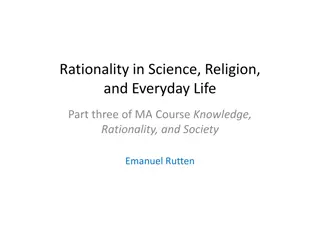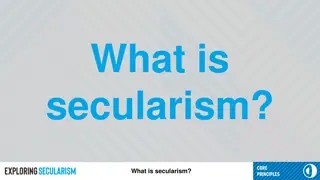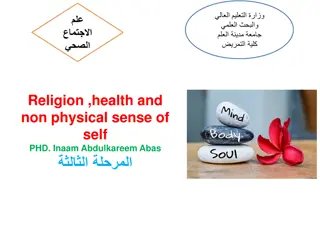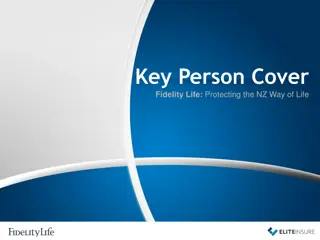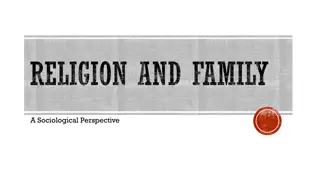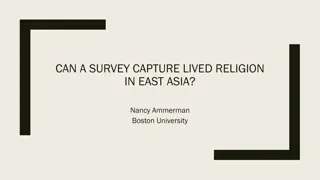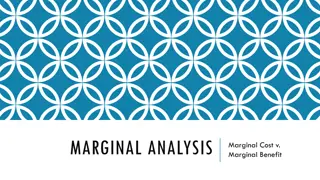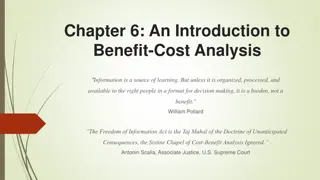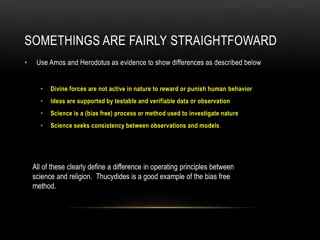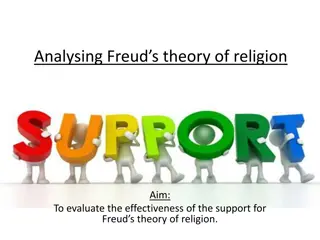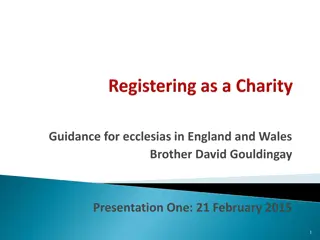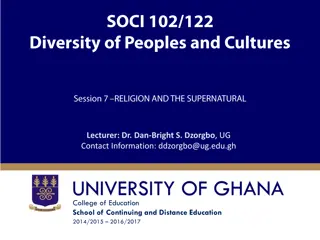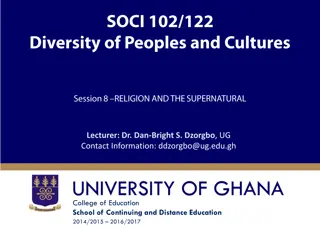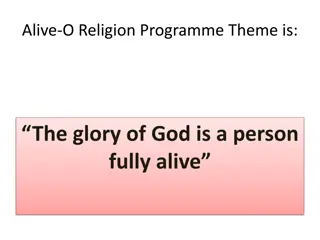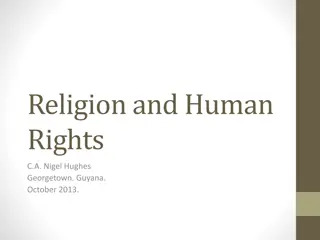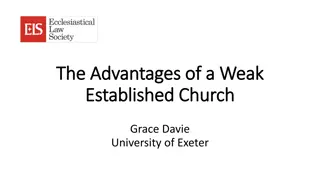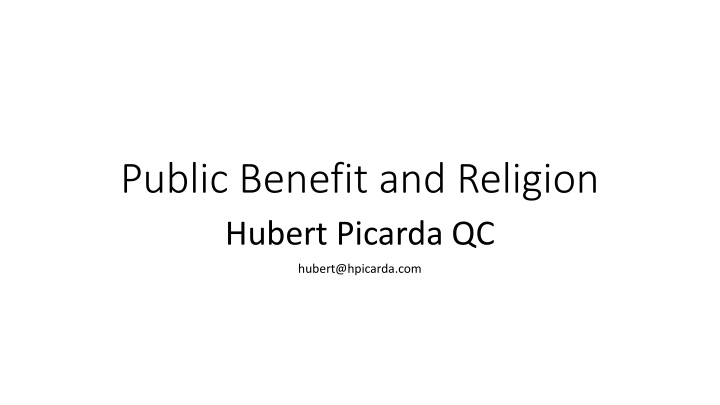
Public Benefit and Religion: Analysis and Considerations
To delve into uncertainties and implications in charity law, exploring the intersection of politics and established religions' public benefit status. The paper discusses controversial topics such as teaching about homosexuality in faith schools, human rights perspectives from legal cases, and potential dangers of common memberships in activist groups. It also addresses issues related to Islamophobia, protests by Christians and Muslims, and ethical considerations in societal activism.
Download Presentation

Please find below an Image/Link to download the presentation.
The content on the website is provided AS IS for your information and personal use only. It may not be sold, licensed, or shared on other websites without obtaining consent from the author. If you encounter any issues during the download, it is possible that the publisher has removed the file from their server.
You are allowed to download the files provided on this website for personal or commercial use, subject to the condition that they are used lawfully. All files are the property of their respective owners.
The content on the website is provided AS IS for your information and personal use only. It may not be sold, licensed, or shared on other websites without obtaining consent from the author.
E N D
Presentation Transcript
Public Benefit and Religion Hubert Picarda QC hubert@hpicarda.com
Contextual 21 Contextual 21st stCentury Policy Radicalism and Century Policy Radicalism and Topical Worries Topical Worries Charity and civil society Charity is political and is at centre of politics Symbiosis of civil society: social justice and advancement of religion Advancement of religion should no longer be treated as charitable Extreme view: charity should be abolished Assimilation and integration versus multiculturism Islam: the waqf, sharia law punishments, jihad, the burka niqab and other dissociative factors
Introduction: purpose of draft paper Introduction: purpose of draft paper To analyse some of uncertainties and chaos introduced into charity law by a policy driven act To consider current position of the rule against politics To consider how far established religions can be made to prove their public benefit Against teaching about homosexuality in faith state schools
Purpose of draft paper Purpose of draft paper contd. contd. To consider in a human rights context what lessons can be learnt from: the compromised Preston Down trust case (Plymouth Brethren) the Human Dignity Trust case the Greenpeace NZ case in NZ supreme court to consider the dangers of common memberships of those in activist campaigning think tanks and those in educational research groups to air questions about Islamophobia as a hate crime and rights of Christians and Muslims to protest (and their possible wrongs in protesting)
The Compromised Preston Down Trust Case The Compromised Preston Down Trust Case (Plymouth Brethren) (Plymouth Brethren) Teachings of Christ & Holy Apostles contained in Holy Scriptures as expounded by certain named individuals and successors: interesting analysis by Debra Morris in her Leverhulme Equality Act study - analysis of law underpinning advancement of moral or ethical systems (September 2008) 18-20,24-28 There are significant doubts involving arguably indefinite and uncertain elements so not exclusively charitable. Trusts are void because deed does not exist and so cannot be amended under express power!
Advancement of the Christian Religion The Service of God is Charitable: Re Darling [1896] 1 CH. 50 Advancement of the Christian Religion Re Brown [1896] 1 IR 423 (Brethren); Re How [1930] 1 CH. 66 [1929] ALL ER 354 (Plymouth Brethren, known evangelicals interest represented by AG ) and Re Redish (1909) 26 TLR 42 (Christian Missionary Periodical run by the Brethren for the Furtherance of Christian Missionary Work in Africa).
Advancement of the Christian Religion: contd. Want of fixed doctrine? Yet Re Price [1943] Ch (Rudolf Steiner) AG v v Hutton (1844) Dr. 480 &; 7 Irish Equity Report 612; AG v Anderson 1888) 59 LJ; Ch; 543, 546, 547. Why lean to invalidity rather than validity? Charity Commission should lean to charity Why improperly presume possibility of potential breach of trust given trustees overriding and statutory duties ? No wonder compromise supervened!
The Human Dignity Trust Case The Human Dignity Trust Case Though only a first-tier decision perhaps over cautiously said to have, or to be of, no precedent value Yet for potential litigants and their counsel it is a very important case. See arguments of counsel. It is a likely reference point for future all the same Litigating human rights and their interface with charity is an important enough issue to go to the upper tribunal Sadly there was inequality of arms: AG not a party nor Revenue or nor any other interest group Considerable very thorough and welcome coverage of arguments of counsel and unchallenged expert evidence and conclusions
The Human Dignity Trust case: contd. No less than eight issues: judgment runs to 31 pages, several more appendix pages on issues generated by the objects Object one (held clearly charitable and requiring no further extrinsic evidence) to promote and protect human rights (as set out in the Universal Declaration of Human Rights and subsequent United Nations Conventions and Declarations throughout the world ) Object two to promote the sound administration of the law There was sufficient clarity in the clause directed
The Human Dignity Trust case (contd.) Charity promoted sound administration of the law: issue 5 pp. 15-18 paras 5560 (submissions) 61 62 (evidence) 63-67 (conclusions particular type of constitutional and strategic litigation distinguishable from activities found objectionable in McGovern para 65) What was test for carrying out purposes that are carried out outside UK: issue 6 , pp 18-21 paras 80-88 (submissions on benefit to UK community) paras 89-9 (citing authorities& evidence) Support and conduct of litigation beneficial: paras 109-112 Charity not a campaigning charity; para 88
Charitys purposes not political because not changing the Charity s purposes not political because not changing the law: para 99 law: para 99 Charity was seeking to uphold the law on which transatlantic authority cited but whose precedent value was not supplemented: para 86 Charity was going through a process of constitutional interpretation to determine whether the domestic law was still valid in the light of the conflict with higher human rights norms: benefit to the community in seeking such interpretation: would man in the street agree? Normally courts disapprove of charities going to law: so does Joe Public
Charitys purposes not political because not changing the law: contd. What imperative was there here? Why beneficial and not inappropriate and/or unseemly especially over issues where compassion not stirred ? Were there any elements that amounted to attempting to sway UK public opinion, some of which evidences coolness, resistance or opposition to human rights industry and its proactive arguments at taxpayers expense?
The Greenpeace NZ case in NZ Supreme Court Political purpose exclusion no longer applies in NZ Purposes that are illegal or unlawful preclude charitable status An illegal purpose is disqualifying Illegal activity may disqualify an entity from registration when it indicates a purpose which is not charitable even though activity might not justify removal from the registry under the statute
The Greenpeace NZ case: contd. It is a matter of fact and degree whether any illegal or unlawful activity, including isolated breaches of the law and other unlawful activites not deliberately undertaken or coordinated, disqualifies a charity from obtaining registration in any particular case Case remitted to the Charities Board Promoting peace or disarmament is an abstraction and how it is to be acceptably worked out may be troublesome and unsuccessful
The dangers of common memberships of those in activist The dangers of common memberships of those in activist campaigning Think Tanks and those in educational human rights campaigning Think Tanks and those in educational human rights research groups research groups Many Think Tanks campaign and lobby hard The internet discloses the existence of many and a top 12 list Interesting example is Education Reform Group intervener in ISC case
The dangers of common memberships of those in activist campaigning The dangers of common memberships of those in activist campaigning Think Tanks and those in educational human rights research groups Think Tanks and those in educational human rights research groups - - contd. contd. Composition of a Think Tank and its common quasi-incestuous link with educational research embarrassment to ISC case Both main parties have this problem which should be authoritatively discouraged and CC and tribunal should be alerted to it and ought to appear or intervene Global warming policy foundation latest example of charitable research body having unbalanced website All campaigning groups are likely to be considering Aid/Watch Human Dignity Trust case and Greenpeace and to lobby for further campaigning including right to litigate
Islamophobia as a hate crime and other questions Islamophobia as a hate crime and other questions Sayeeda Warsi, Theresa May and Jeremy Corbyn on Islamophobia and hate crime Addressing the race and human rights cards
Islamophobia as a hate crime and other questions Islamophobia as a hate crime and other questions- - contd. contd. Are there duties, in the present climate of extremism, on religious leaders and trustees of religious charities to promote tolerance in the interests of good citizenship and social cohesion? To oppose and attack intolerance in their congregations issuing appropriate directions and co-operating with other agencies? To prevent reference to Christians and Humanists as infidels? To condemn destructive attack on Christian churches, architecture and sacred paintings and Western representational art wherever that happens? Is the promotion of Jihad charitable or permissible and on what grounds?

